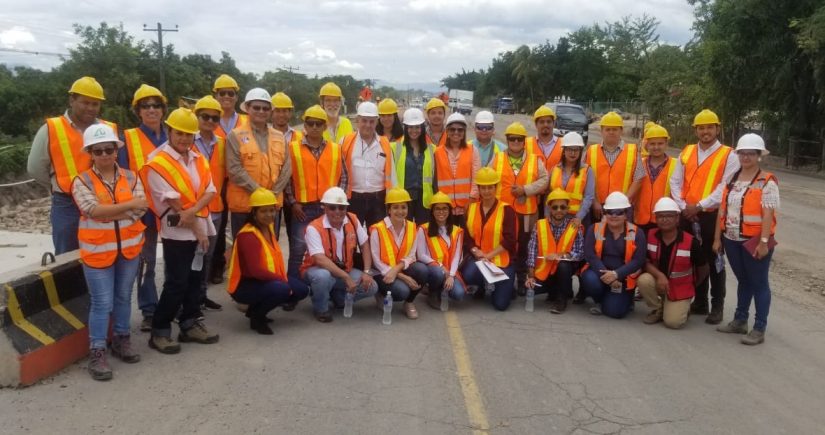A site visit carried out by CoST Honduras has highlighted a lack of transparency, after a team of experts and students found inconsistencies along a major road upgrade on the Comayagua Highway. Representatives from CoST Honduras, alongside 25 delegates from CoST Honduras’s workshop on monitoring public infrastructure projects, visited the site to report on the progress of the works as part of a training exercise. However, delegates noted discrepancies between information provided about the project and the work being carried out, underscoring a need for greater accountability mechanisms.
Building capacity across society
CoST Honduras’s project monitoring workshop focussed on building capacity among engineers, architects and students to track the progress of infrastructure projects and identify inconsistencies in their implementation. The Comayagua Highway project is an apt site to visit in this respect: despite having funding approved in 2012, implementation was suspended for several years due to a lack of definition around the scope of the project. With these issues resolved, work has resumed and includes the paving of nearly 5km of road and the construction of two new lanes. These lanes will mean the size of the road is consistent with others in the area and will reduce congestion.
The students made several observations based on progress at the site and conversations held with entities involved in both planning and construction. They were left with a lack of confidence in the information given to them, which was largely due to inconsistencies between responses from interviewees and the work observed on site. This was not helped by a lack of disclosed project data, which makes monitoring progress – and holding entities accountable – a difficult task.
After the site visit, the workshop participants presented a report with these findings, including recommendations for improving the transparency of the project in the future. One recommendation was the use of CoST resources and guides to better support project implementation.
Clear value given to civilian feedback
The are also positive developments to note: since the project’s conception in 2012, its design has been amended in line with public feedback. This feedback has led to a new motorway junction being included in the plan, as well two underground tunnels for cars and pedestrians. These changes are an encouraging indication of the value placed on public feedback, especially concerning infrastructure projects which are ultimately designed to serve them. These amendments have increased the project cost from US $12.8 million to US $18 million dollars.
The training provided through workshops such as this form a key part of the CoST core feature of social accountability. This recognises the important role played by civil society and the public in monitoring projects such as the one on the Comayagua Highway, and equipping them with the knowledge and tools to act when they are poorly executed.
The Comayagua project is current planned to be included in CoST Honduras’s seventh assurance process, which will be carried out in 2020.
